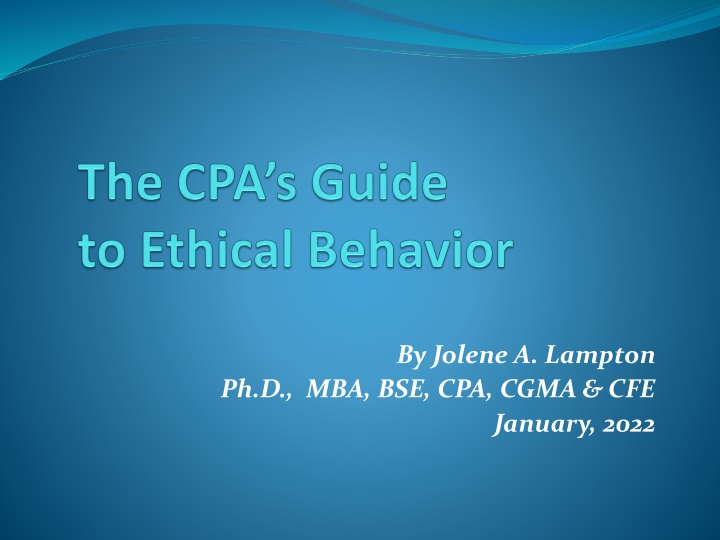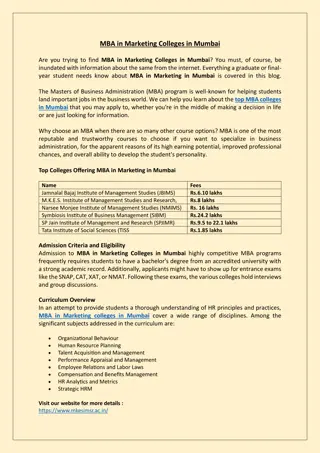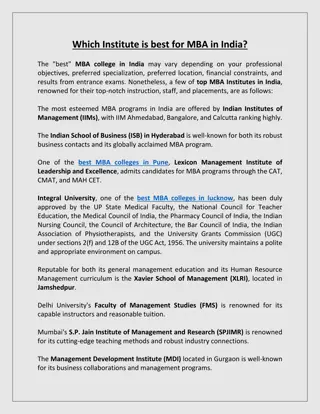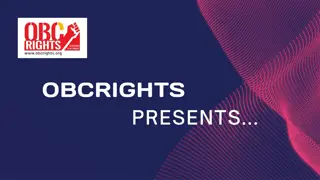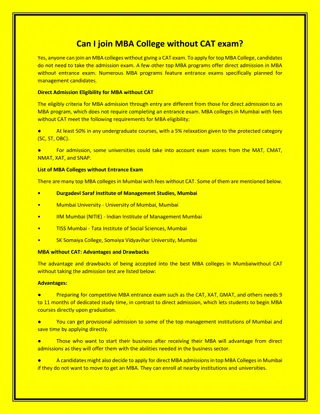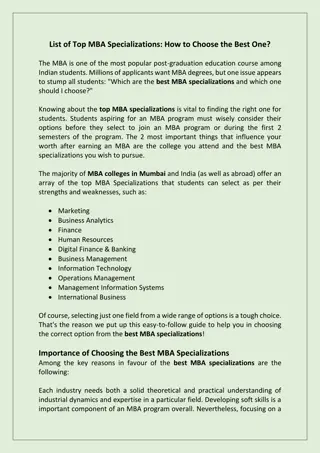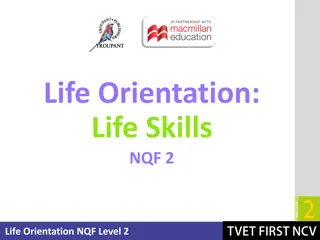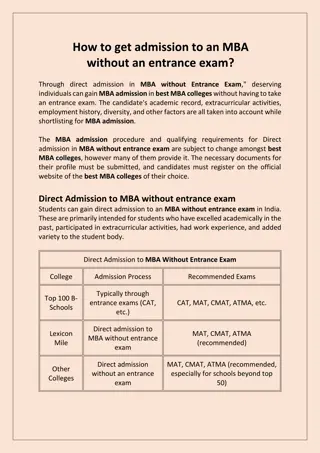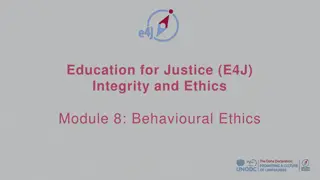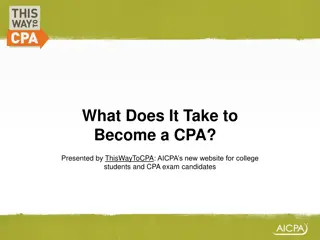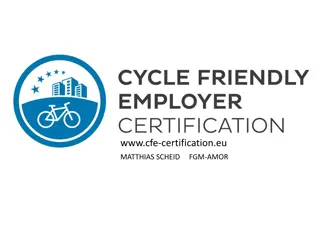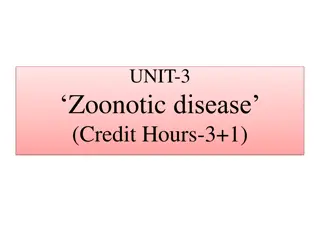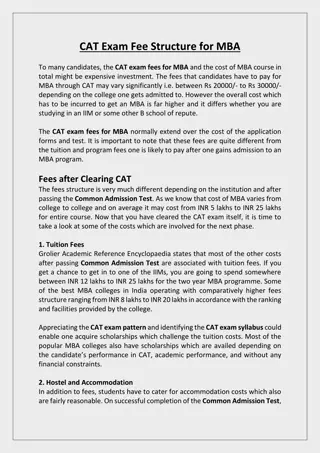The CPA's Guide to Ethical Behavior by Jolene A. Lampton, Ph.D., MBA, BSE, CPA, CGMA & CFE
Delve into the ethical realm with insights from Jolene A. Lampton, a seasoned CPA, as she explores the essence of ethical behavior in the accounting profession. Discover the fundamental principles of honesty, integrity, and compassion that underpin ethical conduct, drawing from historical philosophers and modern-day ethical standards. Explore the significance of values, societal participation, and consistency in upholding ethical standards in business settings.
Download Presentation

Please find below an Image/Link to download the presentation.
The content on the website is provided AS IS for your information and personal use only. It may not be sold, licensed, or shared on other websites without obtaining consent from the author.If you encounter any issues during the download, it is possible that the publisher has removed the file from their server.
You are allowed to download the files provided on this website for personal or commercial use, subject to the condition that they are used lawfully. All files are the property of their respective owners.
The content on the website is provided AS IS for your information and personal use only. It may not be sold, licensed, or shared on other websites without obtaining consent from the author.
E N D
Presentation Transcript
By Jolene A. Lampton Ph.D., MBA, BSE, CPA, CGMA & CFE January, 2022
The CPAs Guide to Ethical Behavior Jolene A. Lampton, Ph.D., MBA, BSE, CPA, CGMA and CFE CPA since 1982; CFE in 2015 Licensed in Texas and Missouri apexcpecourse since 2007 Full-time professor teaching accounting at Park University Ethics is a research area for Dr. Lampton; Dr. Lampton completed the 2011 Bentley University Global Business Ethics Symposium in Marseille, France and other scholarly activities in ethics
The CPAs Guide to Ethical Behavior E Everywhere T All the Time H Be Honest I Act with Integrity C Have Compassion S For What is at Stake is Your reputation, Your Self-esteem, Your Inner Peace.
The CPAs Guide to Ethical Behavior Ethics----is based on the Golden Rule; Comes from the ancient Greeks Socrates, Plato and Aristotle; Philosophers include: Immanuel Kant (1724-1804) Moral acts undertaken from a sense of duty dictated by reason Lawrence Kohlberg (1927-1987) Stages of Moral Development 6 stages CPA s typically operate at Levels 3 or4 [levels where being influenced is common]
The CPAs Guide to Ethical Behavior Ethics is a matter of ethos or participation in a community . . . a way of life; To be moral means doing things right; It pays to pursue a wider role on environmental and social issues; Core tenets on which a company is built; Core tenets emulate from values; Companies with values are good companies to work for!
The CPAs Guide to Ethical Behavior Our values do have voices---that we can use; Values are what we really want is strive for: to be able to feel like we have voiced and acted on our values is gratifying; Need to focus our energy on finding ways to be consistent with our values.
The CPAs Guide to Ethical Behavior Business practitioners can voice and implement their values . . . in the face of countervailing pressures in the workplace Without whistleblowing; Some people do voice and act on their values [and do so effectively]; Diminishing the impact of self-justifying rationalizations for actions; Acknowledge values and ethical choice
The CPAs Guide to Ethical Behavior Ethical Approaches Code of Ethics or Statement of Values Cluster of objectives . . . core tenets on which the company is built Mission Statements Tone from the Top Ways to use ethical reasoning Let values have voices Group/team approach to talk through dilemmas Message from the Top of the organization Leadership by example the best way!
The CPAs Guide to Ethical Behavior Vital to gain an understanding of the culture of the organization Culture must support and nourish ethics CEO should continuously demonstrate his/her expectations Serves as a constant reminder to employees CEO must require management team to expect clear numbers, good operations, clear measurements Tips when known must be dealt with fairly When the above practices are the norm, the culture stands a good chance of becoming an ethical culture.
The CPAs Guide to Ethical Behavior An ethical culture Requires constant behaviors Always performed Even under fire To become habit for the organization; . . . demands that the correct message be sent or it will be severely impaired.
The CPAs Guide to Ethical Behavior To ensure an Ethical Culture Create forums of ethical issues and dilemmas that face employees Articulate steps to resolve matters Role play training situations to practice the right thing Highlight methods to be taken to resolve situations If corrective action is taken no matter what it takes, employees get the message! Culture is set in intricate and critical ways! Obviously, the culture can be severely impaired if the wrong message is sent!
The CPAs Guide to Ethical Behavior Ethical culture requires ethical reasoning coming through in various ways CEO must lead by example CEO and executive team need to display the expectation for ethical standards continuously Ethical practices need to be reinforced in training and compliance programs Steps for ethical reasoning should be documented in P&P manuals Ethics needs to be the rule for the organization.
The CPAs Guide to Ethical Behavior "Ethics isn t just about tone at the top. It s about tone throughout the organization." Jeff Thomson, CMA, CAE IMA President
The CPAs Guide to Ethical Behavior Best Practices for Making an Ethics Code Effective (Barman and White, 2014) Root the code in core values such as trust and integrity. Give a copy to all staff. Provide a way to report breaches in a confidential manner. Include ethical issues in corporate training programs Set up a board committee to monitor the effectiveness of the code. Report on the code s use in an annual report. Make conformity to the code part of a contract of employment. Make the code available in the language of staff located overseas. Make copies of the code available to business partners including suppliers. Make a named individual responsible for code implementation. Review the code in light of changing business challenges. Make sure senior staff walk the talk.
The CPAs Guide to Ethical Behavior To maintain public confidence, follow good business practices; CPAs need to expect the organization they serve to work for the public interest! Formulating an ethical climate is good business!
The CPAs Guide to Ethical Behavior Expectation from mid-level managers is
The CPAs Guide to Ethical Behavior Public Accountancy Act directs the Texas State Board of Public Accountancy to develop rules of professional conduct to establish and maintain high standards of competence and integrity; Follow the Rules of Professional Conduct from the TSBPA
The CPAs Guide to Ethical Behavior Rules of Professional Conduct of Texas Administrative Code EXAMINING BOARDS http://texreg.sos.state.tx.us/public/readtac$ext.ViewTAC?tac_view=3&ti=22& pt=22 TEXAS STATE BOARD OF PUBLIC ACCOUNTANCY RULES OF PROFESSIONAL CONDUCT http://texreg.sos.state.tx.us/public/readtac$ext.ViewTAC?tac_view=4&ti=22& pt=22&ch=501 Subchapters A through E
The CPAs Guide to Ethical Behavior http://texreg.sos.state.tx.us/public/readtac$ext.ViewT AC?tac_view=3&ti=22&pt=22
Rules of Professional Conduct - Rationale Standards of competence and integrity in practice of public accountancy . . . For the public . . . This means you are, in essence, working for the public interest . . . accountants work for the public interest.
Serving the Public analogous to military service
Professional Standards A certificate holder shall not permit his name to be associated with financial statements unless he has complied with GAAS. A certificate holder shall not issue a report asserting that financial statements are in conformity with GAAP. Must comply with other applicable standards. Subchapter B states The public accounting profession has a duty to follow generally accepted auditing standards, generally accepted accounting principles, or other applicable professional standards.
Subchapter C Responsibilities to Clients Independence is impaired if certificate holder has: Any direct or material indirect financial interest in the client Any service as trustee or executor/administrator of estates/trusts Any investment or loans with client Any association with clients even by close relatives that would lead a reasonable person to conclude threat to objectivity/independence. In order to serve clients, a certificate holder must be independent in fact and appearance when performing engagements in which a report will be issued on financial statements.
Receipt of Commissions or other compensation If compensation is received for services or products, disclosed in writing. Disclose regardless of amount. Certificate holders shall not receive commissions when they perform services requiring independence.
Receipt of Contingency Fees Contingent fee is liable or probable to occur due to dependence of a future event. Certificate holder shall not perform any services for a contingent fee for services requiring independence. Prohibits things such as: No tax return services for contingent fees no accounting expert services for contingent fees
Integrity and Objectivity Certificate holder shall maintain integrity and objective, shall be free of conflicts of interest and shall not misrepresent facts now subordinate judgment to others. Attest engagements requiring independence cannot be eliminated by disclosure Cannot pay commissions for clients
Competence Competence includes technical qualifications and ability to supervise and evaluate work of others Certificate holder shall not undertake any engagement for performance of services which he/she cannot reasonably expect to complete with due professional competence. Requires due professional care
Confidential Client Communications Be discreet; keep client things confidential Disclose only if pursuant to court proceedings, subpoenas or other compulsory services
Records and Work Papers Upon request, regardless of the status of the client s account, a certificate holder shall provide records to the client used in performance of professional services. Reasonable to charge for personnel time/ copying, etc. Working papers developed during services are the property of the certificate holder
Subchapter D Responsibilities to the Public Certificate holders have a duty to ensure the public interest in practice of public accountancy. Responsibility to serve the public interest is all important. Certificate holders must allow use of his/her name with a set of financial statements with clear lines of responsibility to investors and others. Scandals have created a major expectations gap between what the public considers as an audited financial statement and what it actually gets. Rules of Professional Conduct clearly states responsibilities.
Practice of Public Accountancy Must be in good standing with the Board Must practice in an entity that is registered in Texas Or state not qualified to register with the Texas State Board of Public Accountancy to practice Certificate holders may not engage in the practice of public accountancy unless he/she holds a valid license issued by the board.
Advertising Violation to persist in contacting clients that do not desire to be contacted Should keep mailings along with lists of persons to whom mailings were distributed for 36 months Certificate holders shall not use any language that is false, fraudulent, misleading, or deceptive or that was obtained with coercion, duress, compulsion, intimidation, thread, overreaching, or vexatious conduct.
Firm Names Firm name is misleading if it is not registered the name misrepresent facts the name indicated character or grade of service the name is likely to mislead or deceive the name implies special expertise the name implies professional attainment that is not factual the name does not include the words corporation or an appropriate abbreviation of such The name includes and company or another similar connotation when there is only ONE PERSON The firm fails to contain the personal name of a partner or shareholder A firm name may not include words relating to the quality of services offered or that is misleading about the legal form of the firm.
Subchapter E Responsibilities to the Board/Profession Certificate holder or licensee has duty to be responsible to the profession while practicing public accountancy Such tone in operations is essential for integrity of performance Now in 2010m we have the U.S. Sentencing Guidelines and Sarbanes-Oxley Act that are intended to document consequences for adhering to good professional practices. Subchapter E documents responsibilities for practitioners to the profession and to the Texas State Board of Public Accountancy.
Discreditable Acts Certificate holders shall not commit any act that reflects adversely on fitness to engage in the practice of public accountancy. Licensees shall report in writing to the TSBPA the occurrence of any event within 30 days in writing Includes: Fraud Dishonesty Violation of any provisions of the Public Accountancy Act Conviction of a felony Conviction of any crime in connection with fraud in any state Revocation of suspension of any authority to practice public accountancy in any state Knowingly preparing false or misleading financial statements Breach of fiduciary responsibility of any type Failure to comply with orders of any state or court Repeated failure to respond to a client s inquiry Perjury in any communication Threats of bodily harm or retribution Public allegations of lack of mental capacity not supported by facts Causing breach in security of the CPA examinations
Frivolous Complaints, Responses, and CPE 120 clock hours of CPE every 3 years as stated in Section 523.63 Certificate holders who accuse other certificate holders of violating the rules should be very factual. Any request for communication from the Board requires a response within 30 days. Continuing Professional Education (CPE) is mandatory.
The CPAs Guide to Ethical Behavior in the 21st Century Sarbanes-Oxley (SOX)
The CPAs Guide to Ethical Behavior CPAs must follow SOX; This means the integrated audit, which covers internal controls; Internal Control Systems deal with control environments that can be as fragile as eggs ; Certificate holders should be aware of red flags and signals of fraudulent activity; SAS 99 and AUC 240 (or SAS 122) says CPAs must look for fraud . . . brainstorm ways fraud could occur (when doing audits of public companies).
The CPAs Guide to Ethical Behavior Fraud costs all of us Good employees can go bad and commit fraud Virtue ethics is important https://hbr.org/2011/06/wise-leadership
